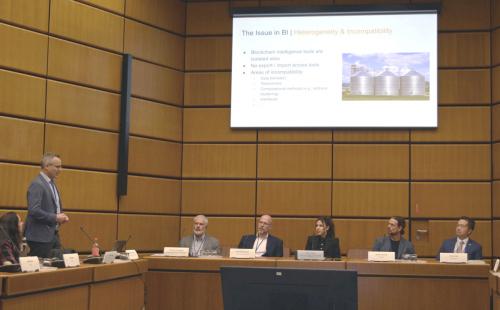How Collective Action can help SMEs overcome the pandemic – Q&A with the Alliance for Integrity's Susanne Friedrich

In this short interview, Susanne Friedrich, Director of the Alliance for Integrity, offers her insights into the current challenges faced by SMEs and how Collective Action can help them emerge stronger on the other side.
What challenges are SMEs facing right now related to integrity and compliance?
SMEs around the globe are facing considerable uncertainty and economic pressure as demand is down and supply chains are disrupted. Many countries have started to relax restrictions, but we are still far from business as usual. The implications of the pandemic are profound.
As a result, SMEs are accelerating the digitalisation of their operations. This creates new challenges and risks, many of which are linked to compliance and integrity.
SMEs engaged in the Alliance for Integrity brought up important issues such as:
- data protection and cybersecurity in times of mobile working
- integrating compliance into e-procurement and online due diligence processes
- addressing new ethical dilemmas that result from the crisis, and
- training employees on compliance online.
You have said that Collective Action is "particularly suited to overcome the consequences of the pandemic"? Why?
SMEs have very limited financial and personnel resources for compliance. Yet, the pandemic and the accelerating digitalisation of operations underline the need to update corruption risk assessments and adapt compliance policies and regulations.
Collective Action is especially helpful in this regard. SMEs benefit from the pooling of resources, peer-learning and the sharing of knowledge. Good practice examples from other companies can provide impulses to implement digital and innovative approaches in SMEs.
Compliance officers from larger companies also have a vital role to play. Their technical knowledge and practical experience are in high demand among SMEs that are currently adapting their compliance procedures.
Getting private sector, public sector, civil society and international organisations together to join forces for integrity is also key to ensure that standards are upheld during the crisis.
And last but not least, Collective Action fosters transparency in times where large amounts of public spending are dedicated to relieving the economic and social consequences of Covid-19. In this context, trust in our institutions is the backbone to build more resilient societies.
How is Alliance for Integrity helping SMEs?
The Alliance for Integrity offers a wide array of activities, such as focused working group meetings, compliance trainings, public-private dialogue and peer-learning formats.
The “Integrity Journey”, for instance, is a training and coaching programme conceived and implemented by large companies, business associations and chambers as well as civil society in order to build compliance capacities among SMEs and strengthen their competitiveness.
SMEs that participated in the “Integrity Journey” told us that the programme has helped them to better react during the coronavirus crisis. As a result of the Integrity Journey they knew their business partners, were aware of the main risks and had defined processes to be able to deal with them. Improved compliance capacities thus make SMEs more resilient in case of a crisis.
Since we are now working from home, most of our activities take place online. A working group of experienced compliance officers has made an effort to digitalise our training programme “From Companies to Companies”. We will pilot the online trainings in June 2020.
Furthermore, we have launched a webpage on integrity in times of crisis with quotes from partners, good practice examples and a collection of articles on covid-19 and implications on compliance.
Lastly, we are developing a webinar series in Latin America on integrity in times of crisis, where we will look at topics such as behavioural compliance, integrity in e-procurement and online due diligence processes, data protection, and how to uphold high standards of compliance and integrity in times of crisis. Sign up for our newsletter or check our website for the latest updates.
The UK government's Business Integrity Initiative is fully subsidising bespoke integrity guidance services for SMEs during the covid-19 situation. What value will that provide?
Compliance and integrity are relevant topics for companies of all sizes and across all sectors. With covid-19 uncertainty and economic pressure mounting, offering guidance services to SMEs for free is not only a kind gesture but will hopefully go a long way in strengthening compliance and integrity in the economic system.
About the author
Susanne Friedrich is the Director of the Alliance for Integrity, a global business-driven, multi-stakeholder initiative seeking to promote transparency and integrity in the economic system. Susanne is an organisational developer with large experience in capacity building and multi-stakeholder management. Before joining the Alliance for Integrity in 2018, she used to work in various projects of the German development cooperation in Latin America and Germany, in fields such as inclusive business and sustainable value chains, export promotion for SMEs and capacity building for decentralisation in the Andean region.



